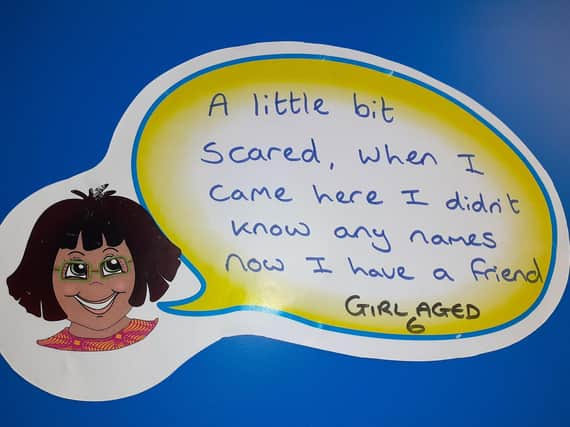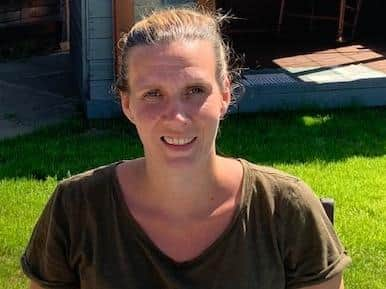Children's voices of hope at refuge for domestic abuse victims


A wall in the creche at the refuge is covered with notes and letters from children thanking staff for helping them and their mums.
One six-year-old girl wrote: "A little bit scared, when I came here I didn't know any names. Now I have a friend."
Advertisement
Hide AdAdvertisement
Hide AdAn 11-year-old girl wrote: "When we arrived at the refuge we were all very nervous but no longer scared, as we left our past behind us to create a better future together.


"I prefer it here as the only thing that gets my mum stressed is the mess we make in our bedrooms."
Inspire North project manager Kira Moxon-Lumb manages the refuge, which cares for around 12 mums and 20 children in 12 flats.
Miss Moxon-Lumb spoke to the YEP about the experiences of children affected by domestic abuse during our week-long series of articles in support of the No Excuse for Abuse campaign.
Advertisement
Hide AdAdvertisement
Hide AdThe campaign , backed by Inspire North and Leeds Rhinos Foundation, has been launched to help raise awareness and to educate the public about how to spot and report the signs of domestic abuse.
It comes as charities, support services and the authorities voice concern amid a global surge in domestic abuse reports during the coronavirus lockdown.
Miss Lumb said calls to Inspire North's independent domestic violence advisor have risen markedly during the lockdown.
She said: "Generally on average we get 20 to 30 domestic abuse referrals per week on our independent domestic violence advisor service.
"Since March 2 we have been getting 40 to 45 calls a week."
Advertisement
Hide AdAdvertisement
Hide AdMiss Moxon-Lumb said the refuge, which is located in the north east of England, looks after women and children referred by social services, police and housing departments.
She said: "When children come in they can be lacking trust and can be withdrawn and frightened.
"We have seen children with signs of depression & trauma. They are very emotional and will not speak to anybody as they see everything as a threat. It takes a long time for them to talk to staff.
"Sometimes their behaviour is quite challenging and can be disruptive and they may struggle to adapt to living in the refuge. But, this is to be expected and we are able to support them in a way that helps them to make sense of what has happened.
Advertisement
Hide AdAdvertisement
Hide Ad"They can become quite attached to their mums and be worried about leaving her side. They are quite nervous because they are wanting to protect mum at all times.
"Our refuge is very safe and secure and the child, after some time, starts to trust the people around them.
"After time and some support the child has gained confidence and made friends in the refuge.
"You notice a difference in their personality and see children flourish in that environment.
Advertisement
Hide AdAdvertisement
Hide Ad"We just want to make a child feel at home as much as we can which means we have to work hard and liaise with lots of other agencies to make sure the child gets the best support available."
A support worker funded by Children in Need is dedicated to helping children and young people at the refuge.
Miss Moxon- Lumb said: "They try and instill some normality and make the children feel at home.
"They enrol the children with the local school and spend time with them to allow mum a safe space to work with her support worker.
Advertisement
Hide AdAdvertisement
Hide Ad"They do one to one and group activities and focus on wellbeing, feeling safe and secure and positive relationships."
Miss Moxon-Lumb said if a child shows signs of aggression or bullying, it can be a sign he or she has witnessed domestic abuse and is then recreating it.
She said: "Other signs that a child has witnessed domestic abuse are bedwetting and insomnia."
Miss Moxon- Lumb said that after around 12 weeks the service tries to move mums on to social housing or privately rented property.